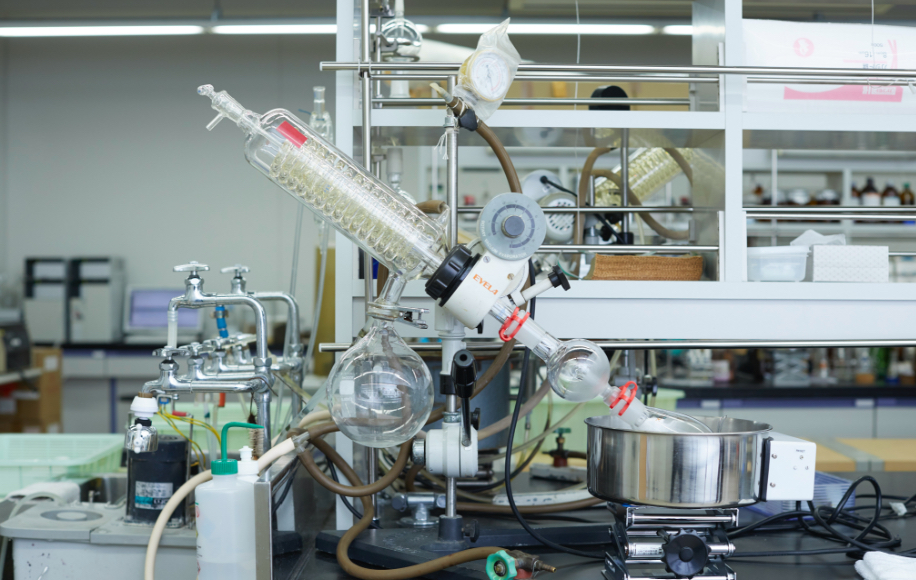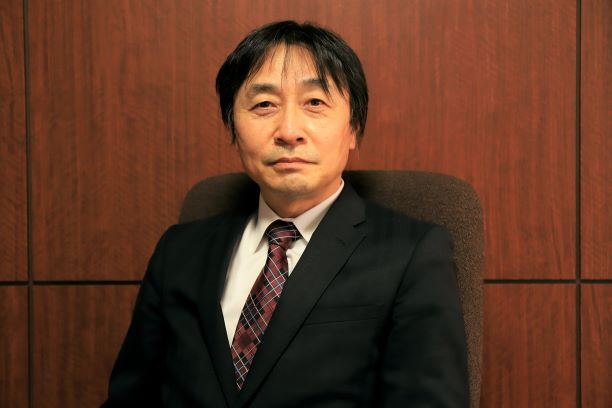

What is the Graduate School of Pharmaceutical Sciences?
Taking Yokohama University of Pharmacy's founding motto, "Reach your fullest potential in life through personal development," as our educational philosophy, the purpose of the Graduate School is to contribute to the development of culture and benefit the welfare of humanity by teaching and studying the academic theory of pharmacy and its applications, exploring all its aspects, and fostering in-depth academic knowledge and outstanding skills.
The concept of "tailor-made treatment" is foundational to contemporary medicine. Numerous biochemistry tests are performed not only at the stage of drug discovery but also at the treatment stage, and even genes that can identify individuals are now being tested in order to personalize prescriptions. The goal of this personalization is not only to ensure drug efficacy but also to alleviate side effects. This concept of tailor-made treatment can be traced back to the initial stages of drug discovery, with measurement techniques to predict drug efficacy and side effects becoming ever more important.
At Yokohama University of Pharmacy, the master's program in pharmaceutical sciences and doctoral program in pharmacy in the Graduate School both cover clinical pharmacy, and based on the concept of tailor-made treatment, we are enhancing our teaching and research on analyzing differences between patients and techniques for measuring response to treatment. These programs also encompass traditional medicine, mainly kampo medicine, and dietary therapy. In the Graduate School we are striving to improve our research and teaching frameworks by making connections between these and modern pharmacy with the goals of identifying mibyo, a concept in kampo medicine that denotes a condition intermediate between health and illness, from the standpoint of modern medicine and reliably enabling patients to recover their health.

● Program objectives
In the pharmacy program, students undertake their own independent research in medical or basic pharmacy, training to become professionals with multifaceted, high-level research skills in medical pharmacy that enable them both to tackle new issues in the diversifying field of precision medicine and to resolve issues, chiefly those related to safety, that are facing community medicine in an aging society with a falling birthrate. In particular, the program aims to train pharmacists and pharmaceutical scientists who can advance research in basic and medical pharmacy related to community medicine that is based on providing the optimum medical care for individual patients and the choice of drug treatment required, as well as the family pharmacy/pharmacist system.
- Course length
- 4 years
- Qualification awarded
- Doctor of Pharmacy (Pharm.D.)
- Number of students admitted
- 3
- ● Diploma policy
-
In the doctoral program in pharmacy, the diploma policy is to award the degree of Doctor of Pharmacy (Pharm.D.) to individuals with the following abilities and qualities who have passed the designated number of academic course units.
- Able to conduct research independently in medical or basic pharmacy, and tackle new issues in the diversifying field of precision medicine
- Possess multifaceted, high-level research skills in medical pharmacy to resolve issues, chiefly those related to safety, that are facing community medicine in an aging society with a falling birthrate
- Capable of advancing research in basic and medical pharmacy related to community medicine based on providing the optimum medical care for individual patients and the choice of drug treatment required, as well as the family pharmacy/pharmacist system
- ● Curriculum policy
-
The doctoral program in pharmacy is an educational program that fosters the ability not only to fulfill cutting-edge roles as specialists in drugs who provide tailor-made medical care for individuals who want to maintain their health, recover from mibyo, or be treated for disease, but also to collect data on their own experiences, leading to the discovery of new side effects or medical techniques. To this end, five research fields in which students can undertake project research (20 units) have been established. These comprise the three medical areas of health science (for health maintenance), recovery from mibyo (kampo pharmacy), and disease treatment (clinical pharmacy), and the two basic areas of drug discovery chemistry and life sciences.
By combining coursework from these research fields, this system also enables students to study intermediate or developing fields. For example, using both life sciences and clinical pharmacy to translate kampo diagnoses into the diagnostic indicators used in modern medicine, or using techniques from drug discovery chemistry, life sciences, and clinical pharmacy in combination to analyze drug interactions and drug efficacy in the process of elucidating the mechanism of action of kampo drugs, opens up a range of possibilities.
- ● Admission policy
-
The goal of the doctoral program in pharmacy is to train the professionals described above. Those admitted will undertake project research in one or more of the five areas of health sciences, kampo pharmacy, clinical pharmacy, drug discovery chemistry, and life sciences. We welcome applications from individuals who understand Yokohama University of Pharmacy's founding motto, "Reach your fullest potential in life through personal development," and who have a passion to contribute to the development of pharmacy as the pharmacy scientists of the future by researching contemporary or traditional medicine in this graduate school in order to acquire the abilities demanded of pharmacy research scientists.
● Program objectives
The pharmaceutical sciences program trains professionals with high-level pharmacy research skills who not only possess in-depth academic knowledge of drug discovery and basic pharmacy and are able to tackle the new issues raised by advances in precision medical techniques, which are becoming increasingly diverse, but who are also able to develop and evaluate new pharmaceutical products and medical technologies that apply basic pharmaceutical knowledge. In particular, the program aims to train researchers and technical experts in pharmaceutical sciences who are capable of gathering and analyzing large amounts of information, including information on kampo drugs and other forms of traditional medicine as well as natural substances and even foods, and applying this to drug discovery or the development of medical technology, and who are consistently capable of original thinking based on experience.
- Course length
- 2 years
- Qualification awarded
- Master of Pharmaceutical Sciences
- Number of students admitted
- 8
- ● Diploma policy
-
As a venue for more practical teaching and research in drug discovery and new medical technologies than that offered by the four-year Department of Pharmaceutical Sciences, the diploma policy of the pre-doctoral (master's) program in pharmaceutical sciences is to award the degree of Master of Pharmaceutical Sciences to individuals with the following abilities and attitudes who have passed the designated number of academic course units.
- Possess in-depth academic knowledge of drug discovery and basic pharmacy and the ability to tackle issues raised by advances in precision medical techniques, which are becoming increasingly diverse
- Possess the high-level pharmacy research skills required to develop and evaluate new pharmaceutical products and medical technologies that apply basic pharmaceutical knowledge
- Capable of gathering and analyzing large amounts of information, including information on traditional medicine as well as natural substances and even foods, and applying this to drug discovery or the development of new medical technology, and capable of original thinking based on experience
- ● Curriculum policy
-
The pre-doctoral (master's) program in pharmaceutical sciences offers lecture subjects in Drug Discovery and Kampo Pharmacy, with the respective aims of cultivating the skills to discover new drugs and new medical techniques, and improving skills in kampo medicine and cultivating the skills to integrate it with modern medicine. The lecture subjects are divided into the three categories of health maintenance, recovery from mibyo, and disease treatment; students taking the drug discovery course focus on health maintenance and disease treatment, while those taking the kampo pharmacy course focus on health maintenance and recovery from mibyo.
- ● Admission policy
-
The goal of the pre-doctoral (master's) program in pharmaceutical sciences is to train the professionals described above. Those admitted will undertake project research in one or more of the five areas of health sciences, kampo pharmacy, clinical pharmacy, drug discovery chemistry, and life sciences. We welcome applications from individuals who understand Yokohama University of Pharmacy's founding motto, "Reach your fullest potential in life through personal development" and who have a passion to contribute to the development of pharmacy as the pharmaceutical science researchers and technical experts of the future.
● Program objectives
In the doctoral program in pharmaceutical sciences, students undertake their own independent research in medical or basic pharmacy, training to become professionals with multifaceted, high-level research skills in medical pharmacy that enable them both to tackle new issues in the diversifying field of precision medicine and to resolve the issues, chiefly those related to safety, that are facing community medicine in an aging society with a falling birthrate. In particular, the program aims to train pharmacists and pharmaceutical scientists who can advance research in basic and medical pharmacy related to community medicine based on providing the optimum medical care for individual patients and the choice of drug treatment required, as well as the family pharmacy/pharmacist system.
- Course length
- 3 years
- Qualification awarded
- Doctor of Pharmaceutical Sciences (Ph.D.)
- Number of students admitted
- 2
- ● Diploma policy
-
The diploma policy of the doctoral program in pharmaceutical sciences is to award the degree of Doctor of Pharmaceutical Sciences (Ph.D.) to scientists who are active in basic and exploratory research supporting precision medicine, particularly at the exploratory and nonclinical study stages, in drug discovery and medical technology development. This degree is conferred on individuals with the following abilities and attitudes who have passed the designated number of academic course units.
- Able to conduct research independently in medical or basic pharmacy, and tackle new issues raised by advances in precision medical techniques, which are becoming increasingly diverse
- Possess the high-level pharmacy research skills required to develop and evaluate new pharmaceutical products and medical technologies that apply basic pharmaceutical knowledge
- Capable of gathering and analyzing large amounts of information, including information on traditional medicine as well as natural substances and even foods, and applying this to drug discovery or the development of new medical technology, and capable of original thinking based on experience
- ● Curriculum policy
-
The curriculum of the doctoral program in pharmaceutical sciences is designed as a continuation of the pre-doctoral (master's program), with the aim of training researchers capable of working in basic and exploratory research, particularly at the exploratory and nonclinical development stages, in drug discovery and medical technology development. Entrants who have not completed the pre-doctoral (master's) program at Yokohama University of Pharmacy may also take courses in that program as optional courses, to help them learn the knowledge and skills required to undertake project research in the doctoral program.
To provide a framework for continuing research, project research (15 units) is undertaken in the same five fields provided in the pre-doctoral (master's) program, creating a curriculum in which research abilities cultivated in that program are further honed through training as pharmaceutical research scientists, and intermediate or developing fields can also be addressed by combining coursework from the different project research fields. - ● Admission policy
-
We welcome applications for the doctoral program in pharmaceutical sciences from individuals who understand Yokohama University of Pharmacy's founding motto, "Reach your fullest potential in life through personal development," who have a passion to contribute to the development of pharmacy as the pharmaceutical research scientists of the future by researching contemporary or traditional medicine, and who have the abilities and other qualities required to undertake the doctoral program in this graduate school.
